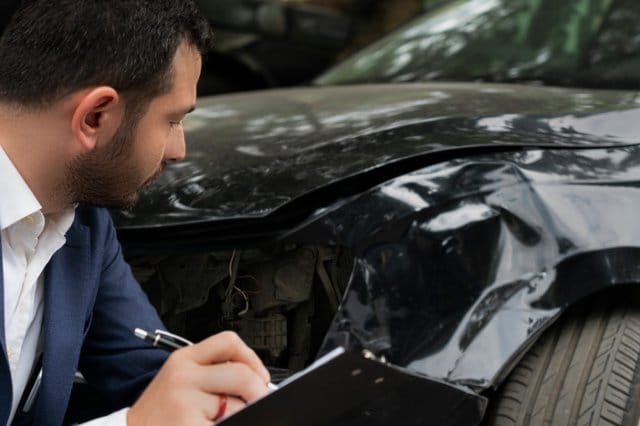Trusted car accident Lawyers
If your vehicle was totaled in a car accident, you might have questions about how the salvage value of a car is determined. Find out here.
 Author: J. Blake Ledbetter, Partner, Conoscienti & Ledbetter
Author: J. Blake Ledbetter, Partner, Conoscienti & Ledbetter
Mr. Ledbetter specializes in civil litigation in metropolitan Atlanta, Georgia, and possesses vast experience in wrongful death lawsuits. Mr. Ledbetter was recognized as a SuperLawyers Rising Star in 2018 and 2019 in the area of Civil Litigation. Published on November 12, 2021, last updated on April 23, 2024.

Speak with experienced car accident lawyer today, for free.
The Importance of Knowing the Salvage Value of a Car
After an accident, filing a property damage claim for your car may be surprisingly difficult, and you may be faced with several options. If you have collision insurance, for instance, you may want to file a property damage claim with your own insurance provider to get better customer service and the chance of getting your claim settled sooner.
You would, however, be responsible for the deductible and will have to seek reimbursement from the irresponsible driver— and that is something you could very well not have to do if you submitted your claim with their insurance company instead. Get in contact with a Decatur car accident lawyer to investigate the matter and help you in court.
What Is the Salvage Value of a Vehicle?
If your automobile has been in a catastrophic accident or damaged by a natural disaster, you may need to know its salvage value before trading or selling it. On a scale of 1 to 5, a major accident that would be a 5.0 on an older automobile may be a 1.0 on a newer model with a greater value.
If the value of your beater commuter car is less than the repair costs or the damage qualifies your car as a complete loss vehicle, a significant accident or body damage caused by a natural catastrophe might be the beginning of the end for your beater commuter car.
This becomes even more vital if your car was damaged in a rideshare accident. So, having an Atlanta Uber accident lawyer fighting for you and talking with the insurance companies on your side is always a good idea.
What Is the Typical Salvage Value of a Vehicle?
Calculating a car’s salvage value is easier than you would believe. Any vehicle’s salvage value varies based on the state and the year, manufacture, model, and state of the vehicle.
The proportion of market value that your motor insurance provider uses is how to determine the salvage value. The amount varies depending on the insurance carrier, but it is usually about 75% of the market value.
Conoscienti & Ledbetter, LLC, recognizes the importance of property damage claims to their clients. Call their office now to book a free consultation to help you with your property damage claim or recover compensation from a negligent driver who caused your collision. Conoscienti & Ledbetter, LLC, is a dynamic and engaged law firm located in downtown Decatur, Georgia, a few miles east of Downtown Atlanta. Give them a call at (404) 373-5800 for a free consultation today!
Calculating the Salvage Value of a Vehicle
To calculate the salvage value, insurers and legal professionals typically start by determining the Actual Cash Value (ACV) of the vehicle before the accident. This involves assessing the car’s make, model, age, mileage, and overall condition. From there, a percentage, often ranging from 25% to 50%, is subtracted based on the extent of the damage and the estimated cost of repairs. This percentage can vary significantly depending on state regulations and the insurer’s policies. For instance, if a car has an ACV of $10,000 and the damage is severe, insurers might apply a 40% salvage deduction, resulting in a salvage value of $6,000. It’s important to consult with a legal expert who understands local laws to navigate these calculations effectively, ensuring that you or your clients receive a fair assessment of the vehicle’s worth post-accident.
How to Determine the Value of a Salvage Vehicle
The salvage value of a vehicle varies based on the state, as well as the vehicle’s year, make, model, and condition.
- Use resources like the Kelly Blue Book and the National Automobile Dealers Association Used Car Guide to determine the wholesaling and retail value of a similar vehicle.
- To calculate the car’s current market value, add these two amounts together and divide by two.
- Calculate the proportion of market value that your insurance provider uses to determine the salvage vehicle’s value. Although the amount varies, it is usually about 75% of the market value.
- Calculate the car’s current market value by multiplying it by 0.25. (1.00 minus 0.75)
- The outcome of this computation will always be less than the car’s current market worth. The automobile is written off as a loss if the cost of repairs surpasses this sum.
How to Calculate Salvage Value of a Vehicle
Kelly Blue Book, the National Automobile Dealers Association Used Car Guide (NADA), and Edmunds are several sources that may assist you in determining your vehicle’s Actual Cash Value. You’ll need to figure out your vehicle’s retail value (what it’s worth to a private party) and trade-in value (what it’s worth to a dealer). To calculate the ACV, add these two numbers together and divide them by half.
Every insurance company has its own algorithm for determining a vehicle’s salvage value. It is usually determined by the costs of disposing of the car and previous salvage auction values. To calculate how much you are paid, deduct this amount from the ACV.

Speak with trusted car accident lawyer today, for free.
How Much Does a Salvage Title Reduce the Value of a Vehicle?
A vehicle with a branded title, whether salvage or rebuilt, will be less valuable than one with a clean title. An automobile with a salvage title or a rebuilt title may be worth thousands less than a similar car with a clean title.
According to auto and insurance industry sources, the value of a car with a rebuilt or salvage title car drops anywhere from 20% to 50%, depending on the type of vehicle and its age.
A salvaged, rebuilt, or otherwise obscured title has a lasting detrimental impact on a vehicle’s value, according to Kelley Blue Book (KBB). Their industry standard is to subtract 20% to 40% of the Blue Book value, but salvage title automobiles should be privately evaluated on a particular instance basis to ascertain their true market worth.
Salvage Value Calculation
Salvage Value (S) = P (1 – i)y
The formula for calculating salvage car prices is relatively simple. Before you can calculate the scrap value, you must first estimate the depreciation rate. You also need to know how long the item will last (the useful life of the asset)
Determining salvage car prices is the first step a company takes before they buy the asset. After deducting this amount from the overall cost of the assets, depreciation is applied to the leftover amount.
What Are My Options?
The first alternative is to get a settlement cheque from the insurance company, which is the market value less any deductibles, and sign over the title to them. The automobile is subsequently sold to a salvage yard by the insurance company.
The second alternative is to keep the car and sue the insurance company for a payout. It’s the difference between the car’s market value and its salvage value, less any deductibles. You are repurchasing the automobile from the car insurance company in this situation.
The car will receive a new salvage title value from the Department of Motor Vehicles. You have the option of keeping the car, repairing it, or selling it to a salvage yard.
What Is Salvage Value in Insurance Claims?
In motor vehicle insurance claims, the practice of seeking salvage cars for damaged components is most widespread. When a car is written off and the insurance settles the claim, the insurer takes custody of the damaged salvage vehicles and sells them at an auction or similar facility. The revenues from the sale of the damaged automobiles benefit the insurer and are used to reduce the amount given to the policyholder as a claim.
Salvage vehicle processes are the most prevalent in auto insurance claims. However, it may also happen in other types of claims, such as household items, commercial stock/inventory, machinery, marine, or even travel insurance.
The insurer typically retains the authority to require the claimant to send damaged property to it upon request, which is usually spelled out in the policy.
There are two explanations for this. The first is that the insurance may want to check the item to confirm the damage and evaluate whether it can be repaired. The second reason is that if the object is irreversibly damaged and the claimant is awarded the total value of the item, the insurer may try to make up for its loss by selling the item.
Choose the award-winning Atlanta lawyers at Conoscienti & Ledbetter, LLC, to represent your case and fight for your property damage claims and settlement negotiations! Our attorneys will examine your case extensively and advise you every step of the way. Contact the Conoscienti & Ledbetter, LLC at (404) 373-5800 for a free consultation today!
Decatur Office
(404) 373-5800
315 W Ponce de Leon Ave. Suite 400 Decatur, GA 30030






